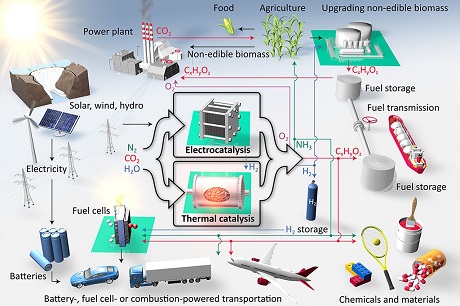
Energy-X consortium will develop new ways of obtaining energy and fuel
04. 03. 2019
On Monday, March 4 in Prague, representatives of thirteen top research institutions from eleven countries of the EU are launching operation of a new association with an ambitious goal: to remove industry’s reliance on fossil fuels. The scientists will focus on research and implementation of catalytic technologies.
Transfer of new knowledge into industry and power engineering will be ensured by more than thirty companies supporting the consortium. A part of the project established by the European Commission is coordinated by the J. Heyrovsky Institute of Physical Chemistry of the Czech Academy of Sciences.
Energy-X was created with the goal of reaching a new concept of energetic sustainability. Therefore, fossil fuels as a primary source of energy will be gradually replaced by hydrogen obtained through renewable resources.
Scientists will focus on development and implementation of catalytic technologies
“The proposed energetic concept has great ambitions to solve a broad range of challenges facing the European Union in the 21st century, especially questions of energetic sustainability, integration of renewable sources of energy, and reduction of atmospheric concentration of greenhouse gases which are negatively affecting the climate change,” says Petr Krtil from J. Heyrovsky Institute of Physical Chemistry of the CAS.
Close collaboration with industry
The Energy-X consortium has been prepared in synergy of leading European experts in the field of heterogeneous catalysis and electrocatalysis and leading European companies covering key subjects in the sectors of chemical industry (DECHEMA) and power industry (EERA). The project is coordinated by Jens K. Nørskov from Technical University of Denmark in Lyngby.
Implementation of technologies based on non-traditional energetic concepts considerate to the environment and capable of maximum utilisation of available resources is a necessary step if the European Union is to be able to compete with other parts of the world in the medium-term future. “This is why Energy-X also focuses on creation of conditions for wide acceptance of the proposed energetic concept both in industrial and social sphere,” emphasises Petr Krtil.
Original Czech text prepared by: Markéta Růžičková, Department of Media Communication of the CAS, in cooperation with Květoslava Stejskalová, J. Heyrovsky Institute of Physical Chemistry of the CAS
Foto: Konsorcium Energy-X
Read also
- Public Hearing: “Making Sense of Open Science”
- SUNER-C concludes after three years dedicated to the renewable energy future
- A trapped state: The pandemic impact on public attitudes, trust, and behavior
- Aerial archaeology: Tracing the footsteps of our ancestors from the sky
- Archaeologists uncover ancient finds along Prague Ring Road
- Our microbiome largely depends on what we eat, says microbiologist Michal Kraus
- The ABCs of writing: Why did its invention mark a turning point for humankind?
- We learn, remember, forget… What can memory actually do? And can we outsmart it?
- New Center for Electron Microscopy in Brno opens its doors to global science
- The hidden lives of waste: What can we learn from waste workers and pickers?
The Czech Academy of Sciences (the CAS)
The mission of the CAS
The primary mission of the CAS is to conduct research in a broad spectrum of natural, technical and social sciences as well as humanities. This research aims to advance progress of scientific knowledge at the international level, considering, however, the specific needs of the Czech society and the national culture.
President of the CAS
Prof. Eva Zažímalová has started her second term of office in May 2021. She is a respected scientist, and a Professor of Plant Anatomy and Physiology.
She is also a part of GCSA of the EU.
